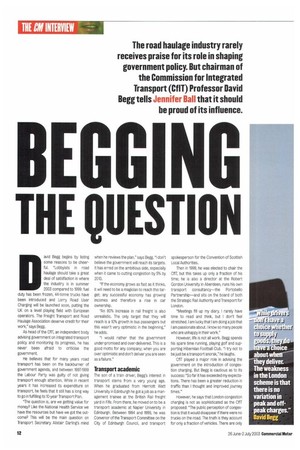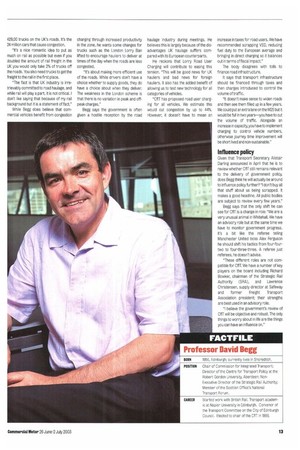11 THE QUESTION
Page 12

Page 13

If you've noticed an error in this article please click here to report it so we can fix it.
avid Begg begins by listing some reasons to be cheerful. "Lobbyists in road haulage should take a great deal of satisfaction in where the industry is in summer 2003 compared to 1999: fuel duty has been frozen, 44-tonne trucks have been introduced and Lorry Road User Charging will be launched soon, putting the UK on a level playing field with European operators. The Freight Transport and Road Haulage Association deserve credit for their work," says Begg.
As head of the CflT, an independent body advising government on integrated transport policy and monitoring its progress, he has never been afraid to criticise the government.
He believes that for many years road transport has been on the backburner of government agenda, and between 1997-1999 the Labour Party was guilty of not giving transport enough attention, While in recent years it has increased its expenditure on transport, he feels that it still has a long way to go in fulfilling its 10-year Transport Plan, The question is, are we getting value for money? Like the National Health Service we have the resources but have we got the outcome? This will be the main question on Transport Secretary Alistair Darling's mind when he reviews the plan," says Begg. "I don't believe the government will reach its targets. It has erred on the ambitious side, especially when it came to cutting congestion by 5% by 2010.
"If the economy grows as fast as it thinks, it will need to be a magician to reach this target: any successful economy has growing incomes and therefore a rise in car ownership.
"An BO% increase in rail freight is also unrealistic. The only target that they will reach is a 10% growth in bus passengers but this wasn't very optimistic in the beginning," he adds.
"I would rather that the government under-promised and over-delivered. This is a good motto for any company; when you are over optimistic and don't deliver you are seen as a failure."
Transport academic
The son of a train driver, Beggs interest in transport stems from a very young age. When he graduated from Herriott Watt University in Edinburgh he got a job as a management trainee at the British Rail freight yard in Fife. From there, he moved on to be a transport academic at Napier University in Edinburgh. Between 1994 and 1999, he was Convenor of the Transport Committee on the City of Edinburgh Council, and transport spokesperson for the Convention of Scottish Local Authorities.
Then in 1999, he was elected to chair the Cf11, but this takes up only a fraction of his time; he is also a director at the Robert Gordon University in Aberdeen, runs his own transport consultancy—the Portobello Partnership—and sits on the board of both the Strategic Rail Authority and Transport for London.
"Meetings fill up my diary. I rarely have time to read and think, but I don't feel stretched. I am lucky that I am doing a job that I am passionate about. I know so many people who are unhappy in their work."
However, life is not all work. Begg spends his spare time running, playing golf and supporting Hibernian Football Club. "I try not to be just be a transport anorak," he laughs.
CflT played a major role in advising the government on the introduction of congestion charging. But Be is cautious as to its success: "So far it has exceeded my expectations. There has been a greater reduction in traffic than I thought and improved journey times."
However, he says that London congestion charging is not as sophisticated as the CflT proposed: "The public perception of congestion is that it would disappear if there were no trucks on the road. The truth is they account for only a fraction of vehicles. There are only
429,00 trucks on the UK's roads. It's the 24 million cars that cause congestion.
It's a nice romantic idea to put as much on rail as possible but even if you doubled the amount of rail freight in the UK you would only take 2% of trucks off the roads. You also need trucks to get the freight to the rail in the first place.
"The fact is that UK industry is irretrievably committed to road haulage, and while rail will play a part, it is not critical. I don't like saying that because of my rail background but it is a statement of fact."
While Begg does believe that commercial vehicles benefit from congestion charging through increased productivity in the zone, he wants some changes for trucks such as the London Lorry Ban lifted to encourage haulers to deliver at times of the day when the roads are less congested.
It's about making more efficient use of the roads. While drivers don't have a choice whether to supply goods, they do have a choice about when they deliver. The weakness in the London scheme is that there is no variation in peak and offpeak charges."
Begg says the government is often given a hostile reception by the road haulage industry during meetings. He believes this is largely because of the disadvantages UK haulage suffers compared with its European counterparts.
He reckons that Lorry Road User Charging will contribute to easing this tension. 'lifts will be good news for UK hauliers and bad news for foreign hauliers. It also has the added benefit of allowing us to test new technology for all categories of vehicles.
"CflT has proposed road user charging for all vehicles. We estimate this would cut congestion by up to 44%. However, it doesn't have to mean an increase in taxes for road users. We have recommended scrapping VED, reducing fuel duty to the European average and bringing in direct charging so it balances out in terms of fiscal impact."
The body disagrees with tolls to finance road infrastructure.
It says that transport infrastructure should be financed through taxes and then charges introduced to control the volume of traffic.
"It doesn't make sense to widen roads and then see them filled up in a few years. We could put an extra lane on the M25 but it would be full in two years—you have to cut the volume of traffic. Alongside an increase in capacity, you have to implement charging to control vehicle numbers, otherwise journey time improvement will be short lived and non-sustainable."
Influence policy
Given that Transport Secretary Alistair Darling announced in April that he is to review whether CflT still remains relevant to the delivery of government policy, does Begg think he will actually be around to influence policy further? "I don't buy all that stuff about us being scrapped. it makes a good headline. All public bodies are subject to review every few years."
Begg says that the only shift he can see for CflT is a change in role: `We are a very unusual animal in Whitehall. We have an advisory role but at the same time we have to monitor government progress. It's a bit like the referee telling Manchester United boss Alex Ferguson he should shift his tactics from four-fourtwo to four-three-three. A referee just referees, he doesn't advise.
"These different roles are not compatible for UT. We have a number of key players on the board including Richard Bowker, chairman of the Strategic Rail Authority (SRA), and Lawrence Christensen, supply director at Safeway and former Freight Transport Association president; their strengths are best used in an advisory role.
"I believe the government's review of CflT will be objective and robust. The only things to worry about in life are the things you can have an influence on."




































































































































































